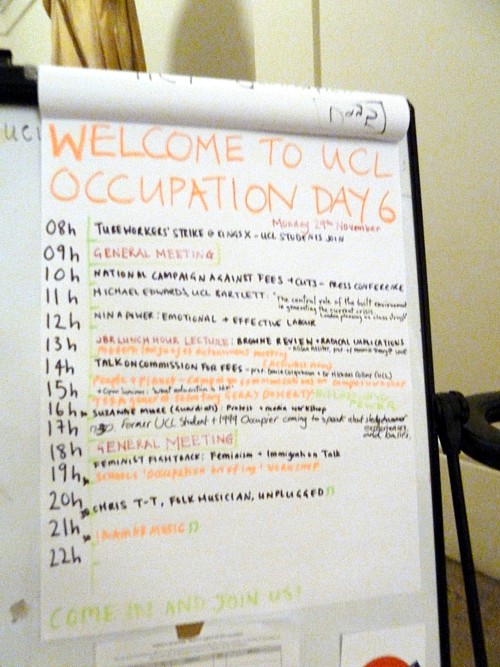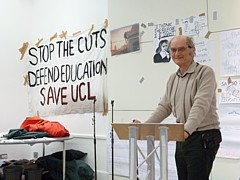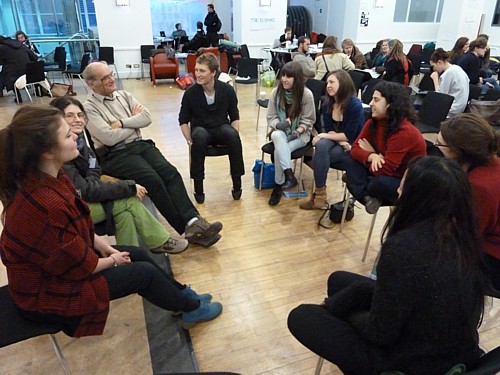tuition fees
Times Higher Education published today a version of an earlier post on this blog, Why should a postman pay for your university education?.
Although the submtted version was within length, it got shortened and, worse, a bit garbled in places. I got no chance to check the final version. The penultimate paragraph was not written by me. So here, for the record, is what I sent them.
|
.We hear a lot about lifelong education, and a good thing too. But we have a government that seems to think socially-useful learning does end at 18. This age is a watershed in official attitudes to education particularly in two areas, religious discrimination and education as a public good. In 1871 the Universities Tests Act made it illegal for a university to discriminate among applicants on the basis of religious beliefs (or lack thereof) and forced Oxford, Cambridge, and Durham to follow in the footsteps of UCL. For the last 140 years it has been unimaginable that any university would allow religious discrimination. In stark contrast, in 2010, religious discrimination (and the accompanying social discrimination) in entry to primary and secondary schools is not only legal, but is actively encouraged by the government. It was a trend that got worse while the ‘reverend’ Tony Blair was prime minister. The minister of education under the new conservative regime promised even more religious schools. Why the rules should be diametrically opposite when you are under 18 from when you are over 18 is baffling. It is equally baffling (and perhaps a partial explanation) that universities are not regarded as part of education at all by this government and its immediate predecessors. Universities are governed by the Department of Business, not the Department of Education. Education is not regarded as a continuum, or as a life-long project: it’s something you do at school. The government has managed the remarkable feat of devising a system for universities in which everybody loses. It saves the taxpayer little or no money (according to HEPI). It leaves universities worse off. And it does both of these while tripling the debt incurred by students. It’s hard to believe that such monumental ineptitude has motives that are other than ideological. The virtual privatisation of post-18 teaching, particularly of humanities, was a step too far even for Margaret Thatcher. The only too brief debate on these changes focussed almost entirely on how to repay an enormous debt. That was the wrong starting point. The first thing that should have been decided was what sort of university system we want. It is arguable that the honours degree system is quite unsuited to an age when half the population get higher education. A general first degree, at a teaching-only institution, would be much cheaper, and it would be a social leveller. If that were followed, for those who wanted and merited it, by a properly taught graduate school (as opposed to the present powerpoint-teaching charades), and this was taught by active researchers at research intensive places, the standard of education would be increased. There might be some problems with such a system, but they were not even discussed before rushing the changes through. The organisation that should have been at the forefront of fresh thinking, UUK, was paralysed as the elite VCs, all in favour of maximum fees, wrangled with the post-1992 VCs who saw themselves at greater risk. The result was total inaction. They may have been on leadership courses, but they failed to lead. The elite VCs are now finding that even £9000 will leave them worse off than before. They really should have thought a bit more about how to adapt to tertiary education for half the population rather than trying to fund things as they are at the moment. Whatever the system, the question will always arise: why should a postman pay for your university education? My answer is that they should pay, but not very much. They should pay because, although they may not get any direct benefit themselves, their children certainly may. The fairest, most progressive, tax is income tax. If you are a postman, or indeed a graduate, on a low income, you shouldn’t pay much tax, so you won’t pay much for other people’s university education. I can see no reason for the sudden change in attitude to, and funding of, education that happens when you reach 18. I see every reason why kids should be angry. I doubt that we have seen the last of the riots. I hope not anyway. |
Follow-up
We hear a lot about lifelong education, and a good thing too. But we have a government that seems to think life ends at 18. The contrast between official attitudes to schools and post-school education is striking. The contrast is most striking in two areas: religious discrimination and public support for costs.
Religous discriminatiion and selection
The Universities Tests Act was passed on 18 June 1871, while William Gladstone (Liberal) was Prime minister. It was "An Act to alter the law respecting Religious Tests in the Universities of Oxford, Cambridge, and Durham, and in the Halls and Colleges of those Universities". Of course UCL was founded in 1826, partly as a place that was free of religious discrimination. Since 1871 it has been illegal for a university to discriminate among applicants on the basis of their religious beliefs or lack of them. For the last 140 years it has been unimaginable that anyone would try to do such a thing.
In stark contrast, in 2010, religious discrimination among entrance to primary and secondary schools is not only legal, but is actively encouraged by the government. It was a trend that got worse while the ‘reverend’ Tony Blair (illiberal) was prime minister. The minister of education under the new conservative regime promised even more religious schools.
Why the rules should be diametrically opposite when you are younger than 18 from when you are over 18 is baffling.
It is equally baffling (and perhaps a partial explanation) that universities are not regarded by this government, or by Blair’s, as part of education at all. They are governed by the Department of Business, not the Department of Education.
Why should a postman pay for your university education?
I imagine that I’m not the only person who has wrestled with this question in the last few weeks (Stephen Law’s thoughts here)
In the UK it is a legal requirement to stay in full time education until the age of 16, and that should be increased to 18 by 2015. Although most children stay in school until 18, around 25% or 30% don’t. I have never heard anybody question the idea that education from 16 to 18 should not be supported 100 percent by the state, out of general taxation. That is the case despite the fact that not everybody stays in education up to 18.
Education up to the age of 18 is regarded as a common good and nobody questions for a moment that it should be free at the point of use.
Once again, everything changes entirely when you reach 18. Education is not regarded as a continuum, or as a life-long project. Suddenly at the age of 18, it stops being a public good worthy of state support, and becomes an optional extra for those who are rich, or those who are not deterred by the idea of going though life paying a debt that will, in some cases, approach the size of the mortgage on their house.
The ConDem coalition, on December 9th 2010, has come very close to privatising the teaching of humanities in universities. You are encouraged to learn languages from 16 – 18 and then these are dropped like a hot cake.
The result has been riots by schoolchildren and total discrediting of Liberal democrats who voted for one of the most philistine measures in living memory.
The discussion of this legislation has, in my view, focussed on the wrong thing. It has been almost entirely about the mechanisms for paying off an enormous debt. That was the wrong place to start. This is what should have been done.
(1) Consider what is being funded. Should the university system adapt to present circumstances, e.g by abolishing honours degrees and creating real graduate schools, as I suggested recently in the Times? Disgracefully, the government has rushed headlong into changes in funding without waiting to consider what it should be funding. Equally disgracefuly, Universities UK (the vice-chancellors’ trade union) has made no constructive suggestions for change, but appears to be rendered immobile by a rift between the Russell group VCs who want to grab as much as they can as soon as possible, and other VCs who fear for their existence.
(2) After deciding what form universities should have in the future, you can then go on to discuss how much public money should be used to support the system.
(3) Only after both of these have been done, does it make sense to talk about how you pay back any contribution made by the student (and that contribution should be, at most, no bigger than now).
In their haste to make people pay high fees, the government seems to have got the worst of both worlds. They have devised a scheme that, in the long run, is likely to cost the taxpayer as much as, or even more than, the present system, while at the same time trebling fees to students. It’s hard to imagine greater incompetence than that.
But the question still lurks: why should a postman pay for your university education? My answer is yes, but not much. They should pay because, although they may not get any direct benefit themselves, their children certainly may. The fairest, most progressive, tax is income tax. If you are a postman, or indeed a graduate, on a low income you shouldn’t pay much tax, so you won’t pay much for, inter alia, other people’s university education.
I can see no reason for the sudden change in attitude to, and funding of, education that happens when you reach 18.
I see every reason why kids should be angry. I doubt that we have seen the last of the riots.
I hope not anyway.
Follow-up
See also UCL’s Beautiful Occupation. Students seem to think more clearly about what’s happening than either university management or the government.
December 10 2010, The New York Times points out that tuition fees in the UK will, under this scheme, be double those of public universities in the USA."this new policy is an utter failure."
December 11 2010. An NHS doctor writes
"I was slightly dissapointed when 7/8 of my first year medical students showed up for their last day of teaching at my practice on thursday December 9th. The eighth student was ill, so not one of them was protesting. When I asked them why not they said that in their first week as medical students they were told not to get involved in any protests because even a police caution would mean they might be thrown off the course and almost certainly they wouldn’t get a job. Images of Fascist Spain or Nazi Germany came immediately to mind (I have just read Alone in Berlin)"
December 11 2010. The Guardian reports:
Liberal Democrat grassroots hit back over tuition fees
Richard Grayson, former director of policy, says Liberal Democrats should move closer to Ed Miliband and Labour
That sounds better.
December 12 2010. The Observer reports:
“Police officers ‘tried to stop hospital staff treating injured protester’ Mother of injured student Alfie Meadows said that her son’s life could have been put at risk by the journey to another hospital”.
The press may like to portray students as irresponsible and revolting . When I visited the occupied Jeremy Bentham room last week, i got a very different impression. That was more than confirmed yesterday (29 November). The students aren’t just sitting around grumbling. They have organised a very impressive series of events. Here is yesterday’s programme.

|
I volunteered to discuss with them some ideas of what could be done to further their aims. It was the same day that our letter came out in the Daily Telegraph, that pointed out the foolishness of deciding on funding before deciding what form universities should have in the future, I also suggested some possible changes along the lines of those proposed in the Times in October. |

|
I didn’t talk for long and the discussion that followed was lively and constructive. It was about education, not revolt.
I was asked if I’d like to come back a bit later for group discussions, so I did. I found the students had split into groups. It could well have been an academic conference.

There was a cheerful but entirely serious discussion about what universities should be doing, about teaching methods and about research. There was also discussion about how the good atmosphere could be continued when the occupation eventually ends. Perhaps the most obvious thing is that the students were enjoying immensely being thrown together with people from other disciplines, whom they would never have met otherwise. There were two scientists in the group I joined, the rest being from a whole range of disciplines.
It is to the credit of UCL that they haven’t brought in bailiffs or cut off access to toilets. So a lot more sensible than Warwick university’s management for example. An email was shown on the screen from Rex Knight, vice provost (operations) who seems to have been put in charge of mediation. He’s the one who refused to do anything about it when HR were advertising for people trained in that curious form of psychobabble/pyramid selling scheme, neurolinguistic programming. He decined to meet the students. These days, you just can’t get the staff.
You can just walk in and out of the Jeremy Bentham room quite freely. Some students left for lectures and then returned. Others were away that afternoon on a demonstration outside TopShop on Oxford Street. If people like Top Shop owner Philip Green paid the taxes that they should do, the crisis might not be as bad as it is.
And between the earnest intellectual stuff they have fun too. This is the dance-off against the Oxford occupation.
And this is their weekend Ceilidh
Their blog is impressive. as is their organisation. They they have an events organiser with their own email address. You can follow the activities on Twitter @ucloccupation. In just a few days they have picked up more followers on Twitter than I have,
Even the BBC reporter, Sean Coughlan, sees this a something a bit different.
These are well-dressed, articulate youngsters, there’s no damage to the room, and the occupation leaflets are mixed up with sleeping bags and text books about biology and Spanish grammar.
This looks like a revolution that probably does the hoovering when it’s finished. Any stereotypes about rent-a-rioter are way off the mark.
,
It’s the Hogwarts kids, with their strong sense of right and wrong, who are now putting up the barricades.
And they seem as distant from the old left as they do from the new right.
This could be the best educational experience of the year for some of them, and they were making the most of it.
It is really rather beautiful.
Follow-up
Sad to say. UCL’s management soon managed to lose the moral high ground and went to court to evict the students. Their blog says
On Friday 3rd December two students on behalf of the UCL Occupations attended a hearing to resist the university’s application for a possession order. After almost an hour of legal debate, the judge acknowledged the occupying students’ rights to freedom of expression and freedom of assembly and concluded that no possession order could be granted without a full hearing of all the legal arguments. The hearing has been adjourned till Tuesday 7th December at 10:30am.
6 December 2010.Hobbled into work, for hospital appointment. The Slade School of Art is now occupied too. The signs are quite, eh, artistic.

